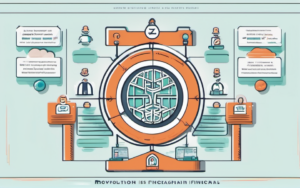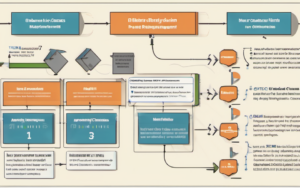The real estate industry has long been plagued by inefficiencies and a lack of transparency. From cumbersome paperwork to the potential for fraud, traditional real estate transactions can be time-consuming and fraught with complexities. However, the emergence of blockchain transparency is poised to revolutionize the industry by introducing a new level of trust, efficiency, and security.
Blockchain: A Game Changer for Real Estate Transparency
The Current State of Real Estate Transparency
The current real estate landscape is often opaque, with information scattered across multiple intermediaries, making it difficult for buyers and sellers to gain a comprehensive understanding of the transaction process. Furthermore, the reliance on paper-based systems creates opportunities for errors, fraud, and delays. These factors can lead to mistrust, uncertainty, and a lack of confidence in the market.
Blockchain’s Role in Enhancing Transparency
Blockchain technology, with its decentralized and immutable nature, can significantly improve transparency in real estate transactions. By recording all transaction details on a shared, distributed ledger, blockchain ensures that information is readily accessible to all parties involved, eliminating the need for intermediaries and reducing the risk of manipulation. This fosters a more equitable and trustworthy environment for all stakeholders.
Key Benefits of Blockchain in Real Estate Transactions
Immutable and Secure Records
Blockchain technology eliminates the risk of tampering with transaction records, as every change is permanently recorded and verifiable. This immutability ensures that all parties can be confident in the authenticity and accuracy of the data, fostering greater trust and reducing the potential for disputes.
Streamlined and Efficient Processes
Blockchain automates many aspects of the real estate transaction process, reducing the need for manual paperwork and intermediaries. This streamlines the entire process, from property listings to closings, making it faster, more cost-effective, and more efficient.
Reduced Fraud and Errors
The decentralized and transparent nature of blockchain significantly reduces the risk of fraud and errors. With all transaction information readily available and tamper-proof, it becomes much harder for malicious actors to manipulate or falsify data.
Increased Trust and Accountability
Blockchain promotes a more transparent and accountable environment by providing a verifiable audit trail of all transactions. This increased transparency builds trust among all parties involved, fostering a more collaborative and secure ecosystem.
Real-World Applications of Blockchain in Real Estate
Smart Contracts for Automated Transactions
Smart contracts, self-executing agreements stored on the blockchain, can automate various aspects of real estate transactions, such as escrow payments, title transfers, and property management. This eliminates the need for intermediaries and reduces the potential for human errors, creating a more efficient and reliable system.
Digital Title Registries for Secure Ownership
Blockchain can create secure and tamper-proof digital title registries, providing a single source of truth for property ownership. This eliminates the need for physical certificates and reduces the risk of fraud and disputes.
Tokenized Real Estate for Fractional Ownership
Blockchain allows for the tokenization of real estate assets, enabling fractional ownership through the issuance of digital tokens representing ownership shares. This opens up new opportunities for investors with limited capital to access the real estate market and potentially diversify their portfolios.
Challenges and Considerations
Regulatory Uncertainty
The regulatory landscape for blockchain technology in real estate is still evolving, with varying regulations across jurisdictions. This uncertainty can create challenges for businesses seeking to implement blockchain solutions.
Scalability and Adoption
Scaling blockchain technology to handle the volume of transactions required in the real estate industry remains a challenge. Furthermore, widespread adoption requires collaboration among stakeholders, including real estate professionals, government agencies, and technology providers.
Data Privacy and Security
As with any technology that handles sensitive data, ensuring data privacy and security is crucial for blockchain solutions in real estate. Robust security measures must be in place to protect data from unauthorized access and cyberattacks.
The Future of Blockchain in Real Estate
Increased Adoption and Innovation
The future of blockchain in real estate is promising, with growing adoption and innovation across the industry. As the technology matures and regulatory frameworks evolve, we can expect to see more widespread use of blockchain solutions for real estate transactions.
Transformative Impact on the Industry
Blockchain has the potential to fundamentally transform the real estate industry by creating a more efficient, transparent, and secure environment. This will benefit all stakeholders, including buyers, sellers, investors, and real estate professionals.
A More Transparent and Efficient Real Estate Ecosystem
By fostering greater transparency, trust, and efficiency, blockchain can pave the way for a more robust and accessible real estate ecosystem. This will ultimately lead to a more equitable and thriving real estate market for all.




